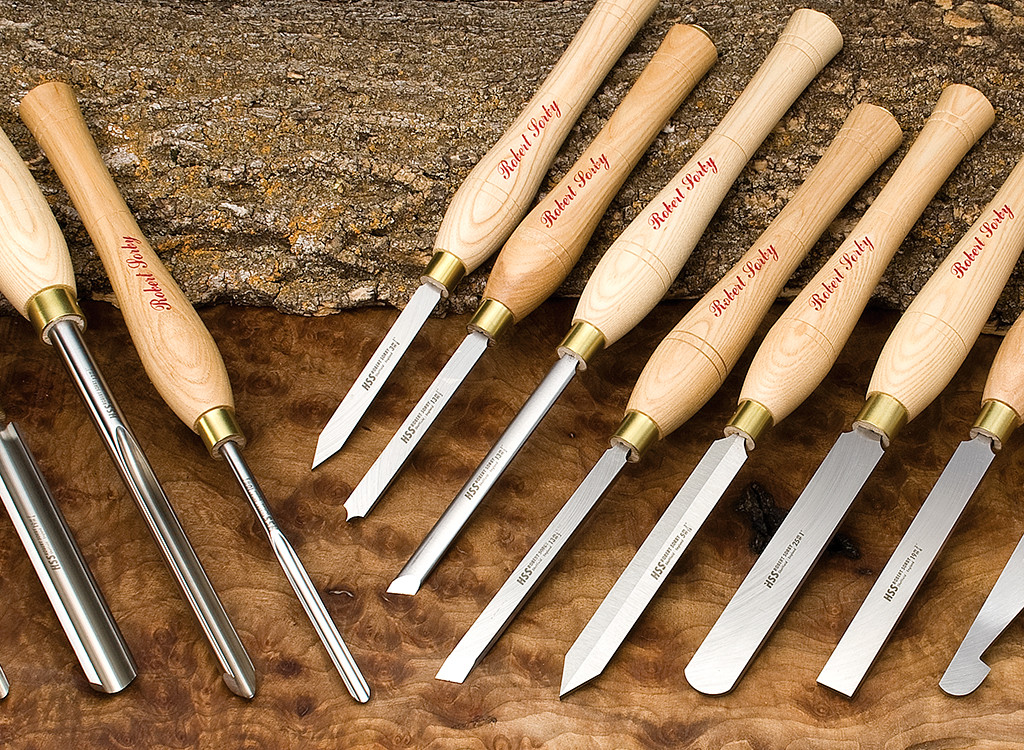
With the large number of tools available today, choosing the right tools may seem difficult. The information in this Tool Selection Guide is here to help you determine which tools you need and which ones you don’t. If you have any questions when choosing tools, please give us a call and we’ll gladly provide helpful advice.
What Tools Do I Need?
In short, there are eight basic types of woodturning tools. Although tool types are available in various sizes and shapes, the how they work and what they do remains the same. The descriptions found on this page will help you determine what tools you need based on the work you want to do.
About Carbide Tipped Scrapers
A relative newcomer to woodturning, carbide tipped tools by Easy Wood Tools are particularly appealing to entry level woodturners as they allow first time turners to enjoy superb results instantly without having to learn complicated tool techniques. These tools utilize a four-sided razor sharp cutter that’s discarded when dull. If you want to experience the joy of woodturning with minimal investment in time and money, Easy Wood Tools are the perfect place to start.
Choosing A Set Of Tools
If you’re just getting started woodturning, we recommend the Beginner Selection listed below. This selection includes tools that will allow you to turn most basic projects. The Intermediate Selection is similar but with a few added tools to accommodate a larger range of projects. All tools are manufactured by Henry Taylor Tools from M2 high-speed steel. Save 10% off the prices below when you purchase 2 or more tools.
Beginner Set
- 1/2″ Bowl Gouge
- 3/4″ Radius Scraper
- 3/16″ Diamond Parting Tool
- 3/8″ Spindle Gouge
- 1/2″ Skew
Intermediate Set
- 1/2″ Bowl Gouge
- 3/4″ Radius Scraper
- 3/16″ Diamond Parting Tool
- 3/8″ Spindle Gouge
- 1/2″ Spindle Gouge
- 1/2″ Skew
- 1-1/2″ Radius/Round Point Scraper
Advanced Set
- 1/4″ Bowl Gouge
- 1/2″ Bowl Gouge
- 3/4″ Radius Scraper
- 3/16″ Diamond Parting Tool
- 1/4″ Spindle Gouge
- 3/8″ Spindle Gouge
- 1/2″ Spindle Gouge
- 1/2″ Skew
- 1-1/2″ Radius Scraper
What Steels Are Tools Made From?
The majority of today’s turning tools are made from heat treated M2 high-speed steel, which is known for its ability to be honed to a fine edge while providing excellent wear resistance. M2 high-speed tools provide maximum value and are recommended for most woodturners. More expensive, premium turning tools are also available and include Henry Taylor Kryo tools made of cryogenically treated M2 high-speed steel for wear resistance 3-6 times that of heat treated M2 high-speed steel. Similar in performance to Henry Taylor Kryo tools, Crown Pro-PM and Hamlet ASP tools utilize powdered metallurgy technology to achieve a similar, superb edge holding ability. All tool types listed above can be sharpened using standard grinding wheels.
How Are Gouges Measured?
Spindle Gouges
Are measured by the diameter of the round stock unless otherwise noted.
Bowl Gouges
Are measured by the width of the flute unless otherwise noted. Add 1/8″ diameter to the indicated flute size and you will have the outside diameter of the round stock.
Exceptions
Oneway Mastercut tools are measured by the diameter of the round stock.
What Makes Each Tool Different?
Bowl Gouges
Bowl gouges are easier to control and remove wood faster than spindle type gouges. We recommend a 1/2” bowl gouge as the first choice when getting started bowl turning.
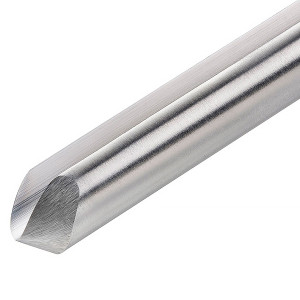
Spindle Gouges
Spindle gouges are designed for work between centers as well as general purpose turning including boxes, pens, small bowls and detail work. We recommend a 3/8” spindle gouge as the first choice. Other sizes and variations can be added depending on your needs.
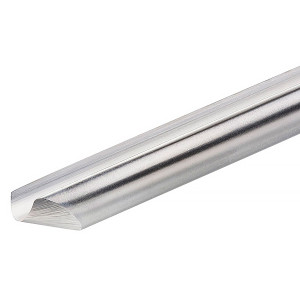
Detail Gouges
Similar to a spindle gouge but with a heavier cross section and shallower flute, a detail gouge utilizes a long bevel and fingernail point to allow you to cut fine detail on beads, decorative grooves and other detail work on bowls and spindles.
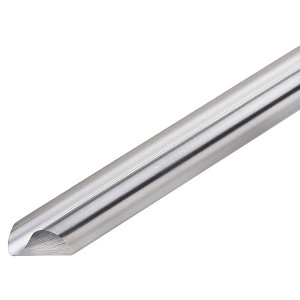
Spindle Roughing Gouge
Used for taking square spindle stock down to round, roughing gouges have a wide, deep flute for rapid wood removal. For use on spindles only. NOT FOR USE ON BOWLS.
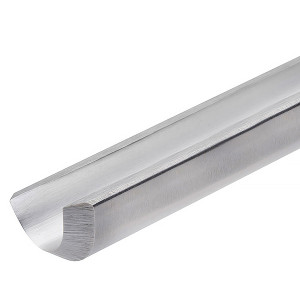
Scrapers
A must for woodturning, scrapers are designed for making light shaping and clean-up cuts to remove imperfections left by gouges and other tools. Properly sharpened with a burr on the top side of the tool, a scraper will leave a very smooth surface ready for finishing. Although scrapers come in a variety of shapes and sizes to suit various needs, they all function the same way.
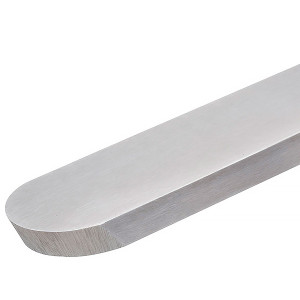
Parting Tools
An essential tool for woodturners, a parting tool is used to part off unwanted material, establish diameters or cut small flat areas. A diamond parting tool is recommended as the tapered design reduces drag during use. Narrow parting tools having a 1/16” wide kerf are recommended for box turning as they help maintain grain alignment by removing a minimal amount of material.
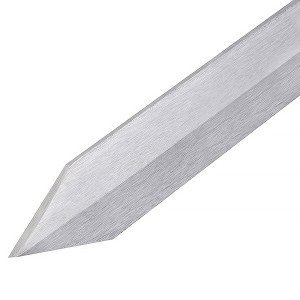
Skew Chisels
The skew chisel is essential for cutting beads and flat surfaces on spindle work. Properly used, a skew chisel will produce a smooth surface requiring minimal sanding. We recommend rounded edge skews as they are easy to manipulate and don’t mark the tool rest.
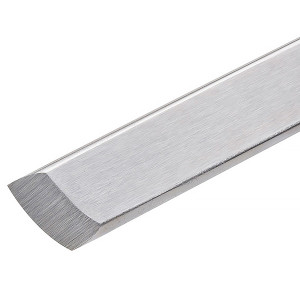
Shear Scrapers
A shear scraper is similar to a standard scraper with the burr on the top side of the tool used to cut the wood. Shear scrapers have a semi-rounded underside that allow you to roll the scraper on its side, which changes the angle of cut from a scraping to a shearing cut resulting in a smoother surface in most cases.
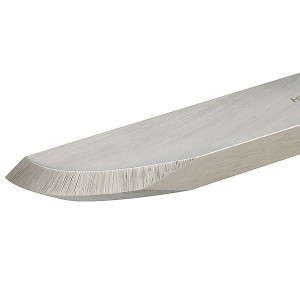

Thanks for sharing this post.
I blog frequently and I genuinely appreciate your content.
The article has really piqued my interest. I will take a note of your blog and keep checking for new information about once a week.
dit is gereedschap daar is geen vervanger voor